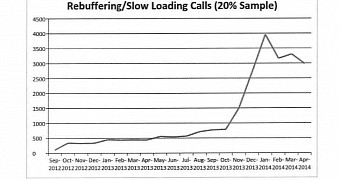Among the 250 pages that Netflix sent over to the FCC explaining its position in regards to the merger between Comcast and Time Warner Cable, there’s a chart buried that explains just why the prospect of Comcast becoming even more powerful is a scary thought.
Re/Code reports that Ken Florance, Netflix’s vice president of content delivery, made quite a statement in the lengthy document, saying that even in its current position Comcast has the power to do a lot of damage to online companies.
Florance has already made a point in saying that the ISP basically forced Netflix to pay for peering and accused Comcast of degrading the quality of Netflix streams for broadband customers. Comcast negated everything at the time and said that the issues must have been Netflix’s own fault, who was only trying to throw the blame on someone else.
Well, in the new document, the Netflix VP said that customers of theirs that were subscribed to Comcast have quit the video streaming service because of all the issues. “Those customers complained to Netflix and some of them canceled their Netflix subscription on the spot, citing the unacceptable quality of Netflix’s video streams and Netflix’s inability to do anything to change the situation,” he writes.
It’s unclear how many customers the company lost, but given the reach Comcast has in the US, the number could be pretty high. Of course, this didn’t damage the company’s growth spurt, but it was certainly a bitter topic.
However, the Netflix exec did include a chart that shows just how bad things got before it agreed to sign the peering deal with Comcast. Most specifically, starting in October 2013, the number of people complaining about rebuffering and slow loading skyrocketed from about 700 complaints to 4,000 in January. Then, things started to calm down a bit, especially since in February Netflix signed the peering deal.
Comcast has been trying to convince regulators that there’s nothing wrong with the prospect of merging with Time Warner Cable, despite the huge number of clients it would gain and the control it would gain on the market. In fact, other companies are quite concerned that Comcast would throttle with speeds and control not only what content people can access on the Internet, but also how various online companies grow and evolve.
This is part of the larger discussion about net neutrality, a concept that states all Internet traffic must be treated the same, which is the exact opposite from what companies such as Comcast want to do.

 14 DAY TRIAL //
14 DAY TRIAL //